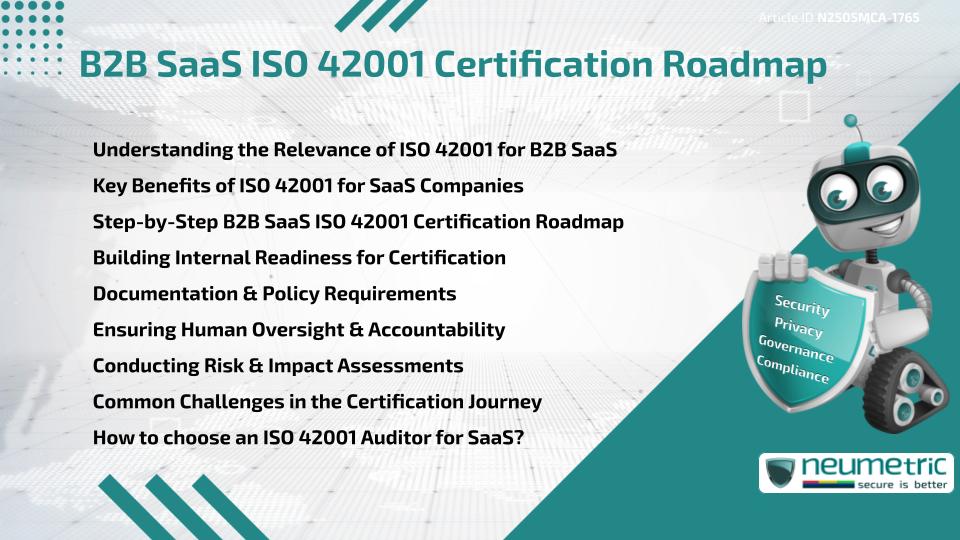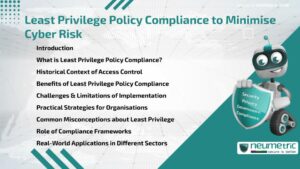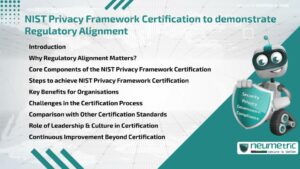Table of Contents
ToggleIntroduction
As B2B SaaS platforms increasingly integrate Artificial Intelligence into core services, ensuring responsible AI Governance has become more than just a value—it is a necessity. The B2B SaaS ISO 42001 Certification roadmap offers a structured approach to build trust, align with ethical Frameworks & strengthen Compliance in AI-driven environments.
ISO 42001, introduced by the International Organisation for Standardisation, is the first globally recognised Standard that addresses Artificial Intelligence Management Systems [AIMS]. For SaaS Providers, it sets clear expectations for transparency, fairness & human accountability in AI-enabled services.
Understanding the Relevance of ISO 42001 for B2B SaaS
B2B SaaS companies operate in a highly regulated, fast-paced digital space where Trust & Data Governance are critical. ISO 42001 helps these providers formalise their internal processes to ensure that AI Systems:
- Operate transparently
- Reduce Risk of bias or harm
- Include meaningful human oversight
- Respect Privacy & user rights
This relevance extends across industries like Finance, Healthcare & Education where regulatory alignment is a must.
Key Benefits of ISO 42001 for SaaS Companies
The B2B SaaS ISO 42001 Certification roadmap delivers measurable advantages:
- Enhanced Customer Trust through transparent AI design & monitoring
- Regulatory preparedness for Privacy laws & AI-specific mandates
- Operational clarity in AI lifecycle management & Risk Mitigation
- Cross-team accountability between development, Compliance & leadership
With responsible AI becoming a business differentiator, the certification also strengthens brand reputation.
Step-by-Step B2B SaaS ISO 42001 Certification Roadmap
1. Assess Organisational Readiness
Start by identifying existing controls, gaps & AI use cases. Define AI Stakeholders & determine whether your AI Systems are high-impact or low-Risk.
2. Appoint Leadership & Define Roles
Establish an AI Governance Team. Assign ownership for Risk evaluation, Policy development & external Compliance alignment.
3. Develop a Responsible AI Policy
This Policy should define your AI values (e.g. fairness, accountability) & map them to operational practices. It becomes the foundation for Audit-readiness.
4. Map & Classify AI Systems
Inventory all deployed AI Models. Classify them based on Risk level, purpose & decision-making influence to prioritise Governance actions.
5. Document AI Lifecycle Processes
Capture development, deployment & decommissioning phases. Include model training data, validation techniques & accuracy metrics.
6. Integrate Human Oversight Mechanisms
Ensure people can override, monitor or validate AI actions. ISO 42001 expects accountability loops where humans remain in control.
Building Internal Readiness for Certification
Internal teams must be aware of their responsibilities under AIMS. Conduct regular training on:
- Ethical AI design principles
- Risk response plans
- Regulatory triggers (like GDPR or HIPAA)
This helps create an internal environment where AI systems are not only operational but also understandable & secure.
Documentation & Policy Requirements
Following the B2B SaaS ISO 42001 certification roadmap involves preparing a wide range of records & documents, such as:
- AI Governance policy
- Risk & impact assessments
- Data sourcing & processing records
- Roles & accountability logs
- Incident Response & Audit procedures
These records need to be consistently maintained & readily available during Audit processes.
Ensuring Human Oversight & Accountability
AI decisions should not be left unchecked. ISO 42001 recommends:
- Manual review checkpoints
- Escalation channels
- Role-based responsibilities
- Automated flagging of anomalies
Oversight ensures fairness, reduces Risk & aligns with human rights principles.
Conducting Risk & Impact Assessments
Before deploying any AI feature, perform Risk Assessments to gauge:
- Potential harm to individuals or groups
- Data Privacy issues
- Security Vulnerabilities
- Impact on end-user decision-making
These assessments must be reviewed periodically or when major changes occur.
Common Challenges in the Certification Journey
While the B2B SaaS ISO 42001 Certification roadmap provides structure, teams often face:
- Difficulty aligning legacy AI Models with new standards
- Lack of cross-functional coordination
- Limited internal knowledge of AI Risks
- Resource constraints for policy implementation
Planning, training & phased adoption can help overcome these hurdles.
How to choose an ISO 42001 Auditor for SaaS?
Look for an accredited auditor who:
- Understands SaaS environments & their AI applications
- Is familiar with GDPR & global Privacy laws
- Has experience in auditing technical & operational controls
- Offers actionable insights post-assessment
An informed auditor adds value beyond certification.
Takeaways
- ISO 42001 provides a structured & ethical AI Governance model for B2B SaaS.
- A clear roadmap helps align teams, tools & processes for Audit readiness.
- Strong documentation, human oversight & Stakeholder roles are crucial.
- Risk Assessments must be ongoing, especially when systems evolve.
- Choosing the right auditor ensures certification is both meaningful & efficient.
FAQ
What is the ISO 42001 Certification for B2B SaaS?
ISO 42001 is a Standard for AI Management Systems that helps B2B SaaS companies govern AI use ethically, transparently & responsibly.
How long does it take to follow the B2B SaaS ISO 42001 Certification roadmap?
Depending on organisational readiness, the process may take anywhere from six (6) months to over a year for full implementation & Audit.
What documents are required for ISO 42001 Certification?
Key documents include your AI Governance policy, Risk Assessments, Audit logs, role definitions & Data Management records.
Is human oversight mandatory under ISO 42001?
Yes, ISO 42001 emphasises that humans must remain responsible throughout the design, implementation & oversight of AI systems.
Can startups adopt the B2B SaaS ISO 42001 Certification roadmap?
Yes, but they should scale the roadmap based on their size, AI maturity & Risk exposure to avoid unnecessary burden.
Does ISO 42001 overlap with GDPR or HIPAA?
It complements them by ensuring responsible AI Governance, especially in areas like Data Protection & automated decision-making.
What difficulties do organisations often encounter when working toward ISO 42001 certification?
Common issues include limited AI Governance awareness, documentation gaps & the complexity of auditing evolving AI Systems.
Why should SaaS companies consider ISO 42001?
It boosts trust, enables better Risk Management & positions companies as leaders in ethical AI Development.
Need help?
Neumetric provides organisations the necessary help to achieve their Cybersecurity, Compliance, Governance, Privacy, Certifications & Pentesting goals.
Organisations & Businesses, specifically those which provide SaaS & AI Solutions, usually need a Cybersecurity Partner for meeting & maintaining the ongoing Security & Privacy needs & requirements of their Clients & Customers.
SOC 2, ISO 27001, ISO 42001, NIST, HIPAA, HECVAT, EU GDPR are some of the Frameworks that are served by Fusion – a centralised, automated, AI-enabled SaaS Solution created & managed by Neumetric.
Reach out to us!





